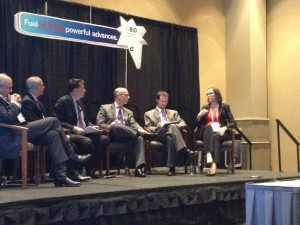 On Monday I attended the panel “The BIOethics of drug development: you decide.”
On Monday I attended the panel “The BIOethics of drug development: you decide.”
In this session, everything was fake. A mock company, iCures, with BioCentury’s Steve Usdin as the pretend CEO, found itself mired in all sorts of bioethical dilemmas. The audience (myself included) acted as Agony Aunts by casting our votes on what the fledgling biotech ought to do when faced with various problems. In our fake case study, patients have been whipping up a social media frenzy over a pancreatic cancer drug in phase 2 that, it seems, has a welcome side-effect: it banishes wrinkles “better than Botox.”
If it were my company, I’d have been uncorking champagne — the serendipitous discovery of Viagra’s use springs to mind. But the panellists were cautious. They correctly explored how Twitter, chat rooms and media hyperbole might threaten their drug’s success. This internet chatter, they said, not only unblinds the trial but also propagates false or possibly inflated information. The fake ompany discussed sanctions and how to penalize patients who cannot stop themselves from sharing their experiences.
Yet I found the outcome of the voting rather shocking. All five panelists — even the patient advocate — and about 80% or the audience voted to ban participants from a trial if they communicated their experience through social media. I found this disappointing. Haven’t these people heard about Obama’s patient-empowered Precision Medicine Initiative, and the NCI’s Match trials that shake up clinical trials and bring them rushing into the 21st century? These and other innovative designs are incorporating next-generation sequencing, -omics of every kind, data algorithms, sensors and digital medicine. Social media is part of the picture, why not embrace it? Get everyone involved, including the FDA, to conjure up novel ways to harness its undoubted power.
After all, RCTs (randomized controlled trials) have been the gold standard for almost 60 years. Maybe it’s time for platinum?

Please sign in or register for FREE
If you are a registered user on Research Communities by Springer Nature, please sign in